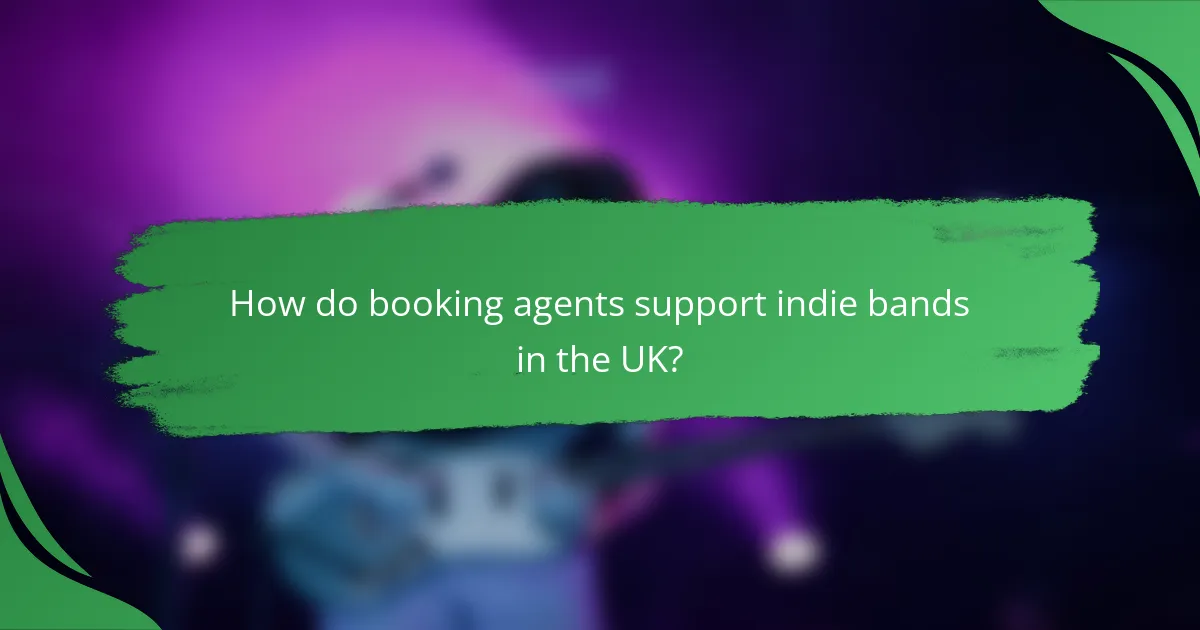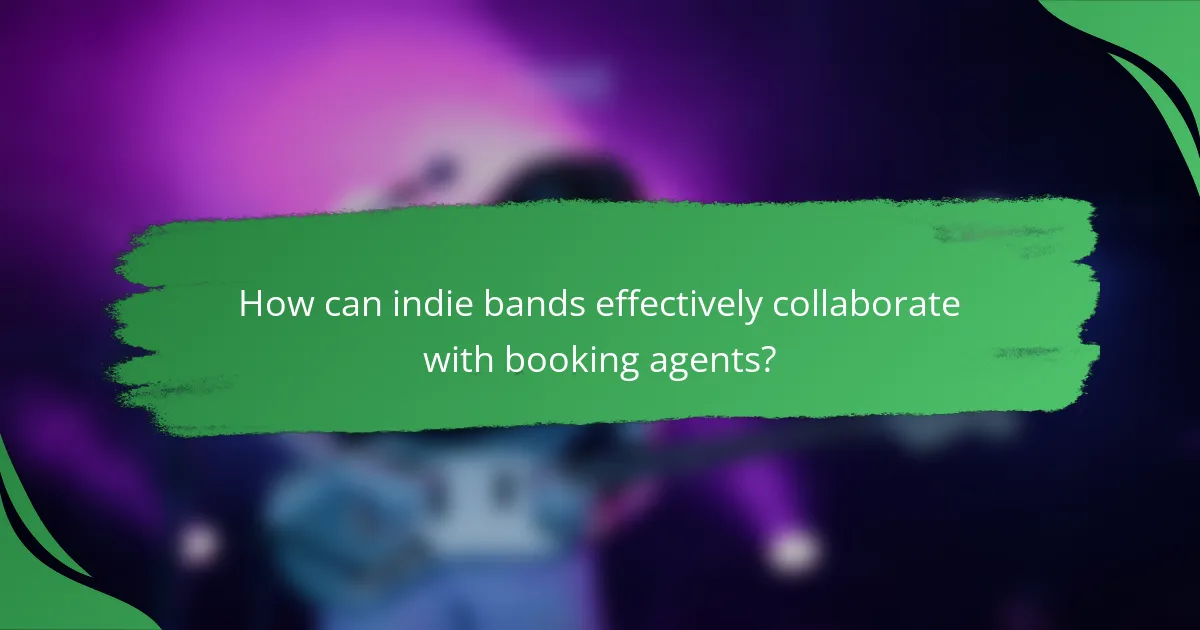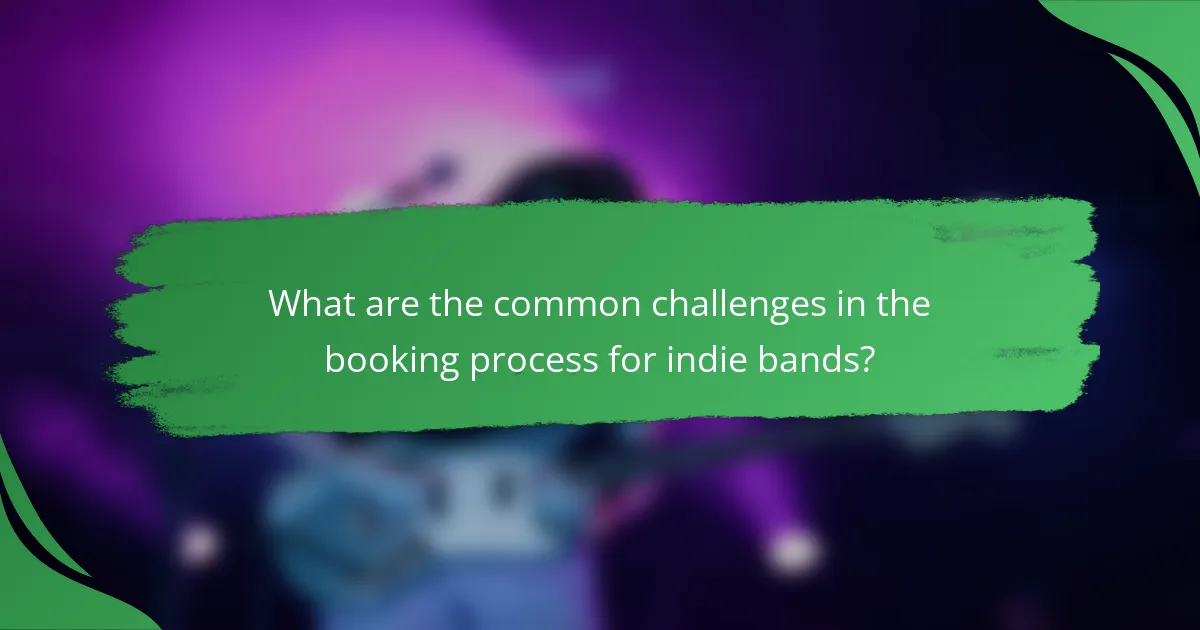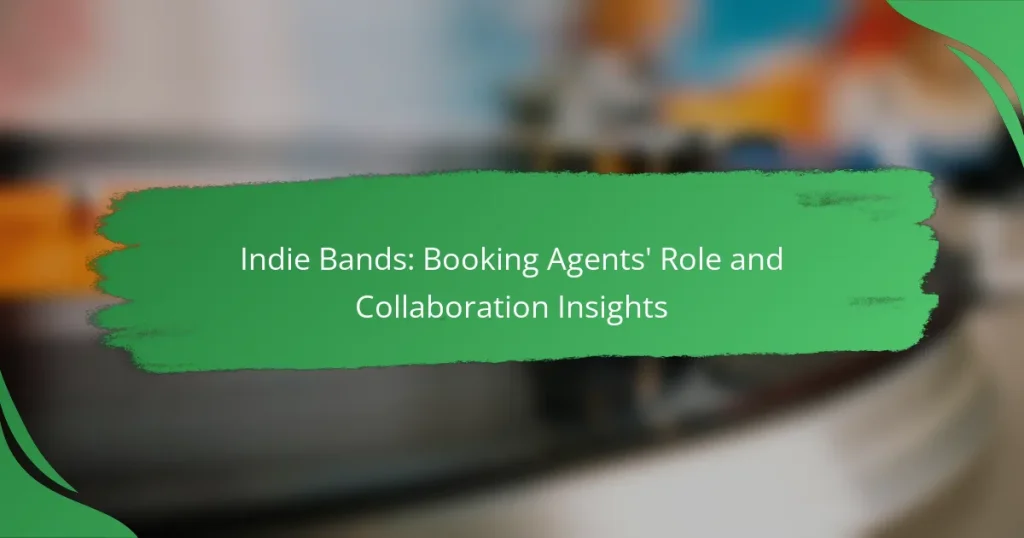Booking agents are essential allies for indie bands in the UK, as they facilitate live performance opportunities and manage the complexities of the booking process. By handling logistics, contracts, and promotions, agents allow artists to concentrate on their music while gaining enhanced visibility and industry insights. Choosing the right booking agent involves evaluating their experience, geographic reach, reputation, and fee structure, all of which can significantly influence a band’s career trajectory.

How do booking agents support indie bands in the UK?
Booking agents play a crucial role in supporting indie bands in the UK by facilitating opportunities for live performances and managing various aspects of the booking process. They help bands navigate the music industry, ensuring that artists can focus on their music while the agents handle logistics, contracts, and promotions.
Negotiating contracts
Booking agents are skilled negotiators who work to secure favorable terms for indie bands in performance contracts. They understand industry standards and can advocate for fair compensation, including performance fees and additional perks like travel expenses or accommodation.
It’s important for bands to communicate their needs and expectations clearly to their agents, as this helps in negotiating terms that align with their goals. Common pitfalls include accepting unfavorable terms due to inexperience or pressure from venues.
Securing performance venues
One of the primary responsibilities of booking agents is to secure performance venues for indie bands. They have established relationships with venue owners and promoters, which can significantly increase the chances of booking desirable locations.
Agents often consider factors such as the venue’s capacity, location, and audience demographics when making recommendations. Bands should provide their agents with a list of preferred venues to ensure that their preferences are taken into account during the booking process.
Marketing and promotion
Booking agents assist indie bands with marketing and promotion efforts to maximize attendance at their shows. They may leverage social media, email campaigns, and local press to create buzz around upcoming performances.
Agents can also help bands develop promotional materials, such as press kits and flyers, which are essential for effective outreach. Bands should collaborate with their agents to align marketing strategies with their brand identity and target audience.
Building industry connections
Booking agents are valuable for their extensive networks within the music industry, which can open doors for indie bands. They often have contacts with promoters, record labels, and other industry professionals that can lead to additional opportunities.
Indie bands should take advantage of these connections by asking their agents for introductions or advice on networking. Building relationships within the industry can lead to future gigs, collaborations, and even record deals.
Managing logistics
Logistics management is a critical aspect of a booking agent’s role, encompassing everything from travel arrangements to technical requirements for performances. Agents coordinate transportation, accommodations, and equipment needs to ensure that bands can perform smoothly.
Indie bands should provide their agents with detailed information about their logistical preferences and requirements. Clear communication helps prevent misunderstandings and ensures that all aspects of the performance are well-organized.

What are the key benefits of collaborating with a booking agent?
Collaborating with a booking agent offers indie bands significant advantages, including enhanced visibility and access to valuable industry knowledge. These benefits can lead to more opportunities and improved overall management of a band’s performance schedule.
Increased exposure
Booking agents help indie bands reach a wider audience by securing gigs at various venues and festivals. This increased exposure can lead to more fans, greater media attention, and potential opportunities for collaborations with other artists.
By leveraging their established networks, booking agents can connect bands with promoters and venues that may not be accessible otherwise. This can significantly boost a band’s profile in the competitive music landscape.
Access to industry expertise
Booking agents possess extensive knowledge of the music industry, including trends, venue preferences, and audience demographics. This expertise allows them to make informed decisions about where and when to book shows, maximizing a band’s chances of success.
Additionally, agents can provide guidance on contract negotiations and industry standards, helping bands navigate complex agreements with confidence. Their experience can be invaluable in avoiding common pitfalls that less experienced artists might encounter.
Streamlined booking process
Working with a booking agent simplifies the logistics of securing performances. Agents handle the time-consuming tasks of contacting venues, negotiating terms, and managing schedules, allowing bands to focus on their music and creative processes.
This streamlined approach can lead to quicker confirmations and less stress for the band, as agents are adept at managing multiple bookings and ensuring that all details are handled efficiently.
Better financial management
Booking agents can help indie bands optimize their earnings by negotiating better fees and terms for performances. Their understanding of the market allows them to set realistic expectations for income based on venue size and audience capacity.
Moreover, agents can assist with budgeting for tours, ensuring that expenses are managed effectively. This financial oversight can help bands maximize profits and sustain their careers in the long run.

What factors should indie bands consider when choosing a booking agent?
Indie bands should evaluate several key factors when selecting a booking agent, including the agent’s experience with their music genre, geographic reach, industry reputation, and fee structure. These considerations can significantly impact the band’s opportunities for gigs and overall career growth.
Agent’s experience with similar genres
Choosing a booking agent with experience in your specific music genre is crucial. An agent familiar with indie rock, folk, or electronic music will understand the unique challenges and opportunities within that niche. This expertise can lead to better gig placements and tailored promotional strategies.
For example, if your band plays alternative rock, look for agents who have successfully booked similar acts. Their existing relationships with venues and promoters can facilitate more effective bookings.
Geographic focus and reach
The geographic focus of a booking agent can greatly influence your band’s touring potential. Some agents specialize in local markets, while others have a national or even international reach. Determine where you want to perform and find an agent whose network aligns with your goals.
For instance, if your band aims to tour extensively in Europe, seek an agent with established connections across various European countries. This can enhance your chances of securing gigs in key cities.
Reputation in the industry
An agent’s reputation can affect your band’s credibility and access to opportunities. Research the agent’s past clients and their success stories. A well-respected agent can open doors to larger venues and festivals, while a lesser-known agent may struggle to secure quality gigs.
Consider reaching out to other bands for recommendations or checking online reviews. A strong reputation often correlates with better negotiation power and industry connections.
Fee structure and commissions
Understanding an agent’s fee structure is essential before signing a contract. Most booking agents operate on a commission basis, typically taking a percentage of the gross income from gigs they secure. This percentage can range from 10% to 20%, depending on the agent’s experience and the services they provide.
Be clear about any additional fees or expenses that may arise, such as marketing costs or travel expenses. Ensure that the fee structure aligns with your band’s budget and financial expectations to avoid surprises later on.

How can indie bands effectively collaborate with booking agents?
Indie bands can collaborate effectively with booking agents by establishing clear expectations, maintaining regular communication, and providing essential promotional materials. These practices foster a strong partnership that can lead to successful gigs and increased visibility.
Setting clear expectations
Setting clear expectations is crucial for a successful collaboration between indie bands and booking agents. Both parties should discuss their goals, preferred venues, and target audiences upfront. This clarity helps avoid misunderstandings and ensures that everyone is aligned on the objectives.
Indie bands should outline their availability, performance fees, and any specific requirements they may have, such as technical needs or accommodations. Booking agents, in turn, should communicate their strategies for securing gigs and the types of venues they typically work with.
Regular communication
Regular communication is essential for maintaining a productive relationship between indie bands and booking agents. Scheduled check-ins, whether weekly or bi-weekly, can help both parties stay informed about upcoming opportunities and any changes in plans.
Using tools like email, messaging apps, or project management software can streamline communication. Bands should feel comfortable sharing feedback and updates, while agents should provide timely information about potential gigs and industry trends.
Providing promotional materials
Providing high-quality promotional materials is vital for indie bands to support their collaboration with booking agents. This includes professional photos, a well-crafted bio, and links to music samples or videos. These materials help agents effectively market the band to venues and promoters.
Additionally, bands should consider creating an electronic press kit (EPK) that consolidates all promotional content in one place. This can make it easier for booking agents to share information with potential venues and increase the chances of securing gigs.

What are the common challenges in the booking process for indie bands?
Indie bands often face several challenges during the booking process, including limited budgets and stiff competition for venues. These obstacles can complicate securing gigs and maximizing exposure in the music industry.
Limited budget constraints
Indie bands typically operate with tight financial resources, which can restrict their ability to book desirable venues or hire professional booking agents. Budget constraints often mean that bands must prioritize local shows or smaller venues, which may not provide the same exposure as larger events.
To navigate limited budgets, bands should focus on building relationships with local venues and promoters who may offer lower fees or even free gigs in exchange for exposure. Additionally, leveraging social media and online platforms can help reduce marketing costs while reaching a wider audience.
Competition for venues
The competition for popular venues can be fierce, especially in urban areas where many indie bands are vying for the same spots. This competition can lead to challenges in securing performance dates, as venues often have limited availability and prefer established acts.
To improve their chances, indie bands should consider diversifying their performance locations, including smaller or alternative venues that may be more accessible. Networking with other local artists and collaborating on events can also increase visibility and create opportunities for shared performances.


